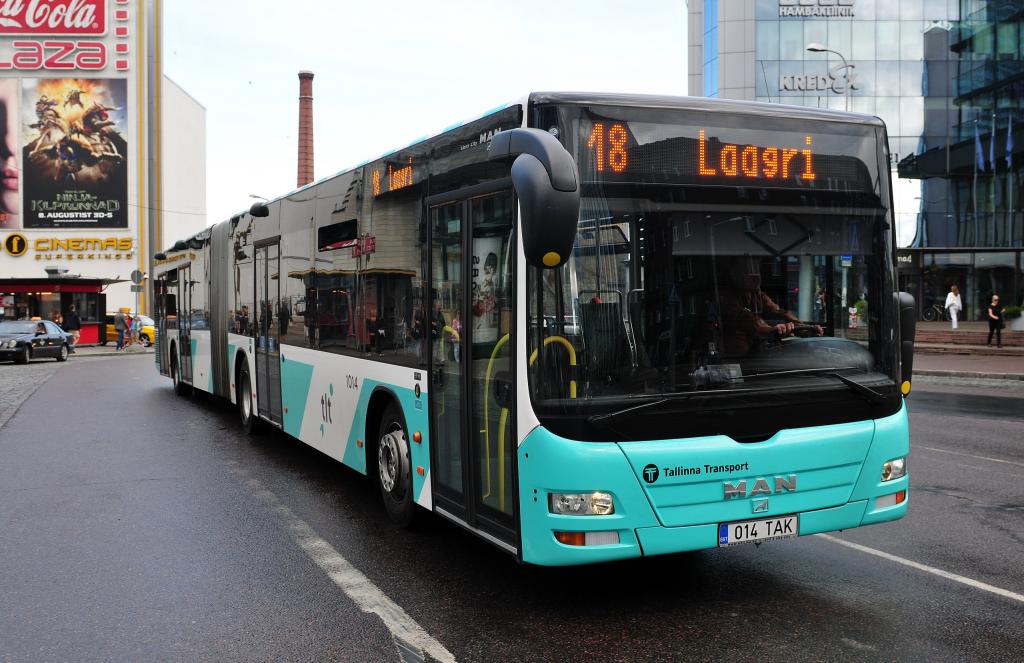Thessaloniki gets ready for its metro launch in November
The underground rapid transit lines have been under construction for almost two decades due to various project delays
 TheMayor.EU logo
TheMayor.EU logo 
Masks have been mandatory in Estonian public transport since 2 August, Source: Ralf Roletschek, Wikipedia, GFDL 1.2
Service providers must request Covid-19 certificates from clients or participants
The relaxation of anti-pandemic measures in Estonia for the summer seems to be over, with the mask mandate to be reintroduced from 26 August in all public indoor spaces where immunity checks are not carried out. So far, face masks have been mandated only in public transport. In activities and events with infection safety controls in place, service providers must check clients and participants for possession of a Covid-19 certificate.
The new measures in response to the highly transmissible Delta variant were announced last week and were approved by the government on Monday. According to the government press office, in addition to public transport (including trains and ferries), the mask wearing obligation is extended to shopping malls, stores, pharmacies, the service halls of telecommunications companies, banks, post offices, libraries, as well as in the service halls of the Police and Border Guard Board, the Social Insurance Board or the Health Insurance Fund, and elsewhere.
Children up to the age of 12 are still exempt from wearing a mask, as are those for whom any obstruction of breathing is contraindicated for health or other important reasons.
Asked why fully vaccinated people are obliged to wear a mask, chief epidemiologist Irja Lutsar told ERR that recent research in the U.S. and U.K. has shown that the vaccinated carry about the same virus load as the non-vaccinated.
She also justified the universal mask mandate with the practical impossibility to check who is vaccinated and who is not in shopping malls, and pointed to the inadequate vaccination rate as well.
The COVID-19 certificate (proof of vaccination, recovery or negative test result) must be presented from 26 August onwards by all people aged 18 and older for most organized activities.
This means that the COVID-19 certificate must be presented for sport, training, youth work, hobby activities and education, refresher training and further training; sporting competitions and events; saunas, spas, water parks and swimming pools. It will also be required for attendance of public meetings and events, including theatre, cinema, concerts, conferences; museums and exhibitions; entertainment services; eating and drinking on-site at catering establishments.
The COVID-19 certificate is not needed for attending outdoor events with unlimited territory or visiting shopping centres and stores. It is also not necessary to prove one's infection safety when buying food for takeaway from a restaurant or cafe. However, as indicated above, a mask must be worn in these places or cases.
Regarding indoor activities, in addition to checking the validity of certificates or carrying out testing on the spot, organizers must also ensure the dispersal of attendees and compliance with disinfection requirements.
To make rapid testing more easily accessible and available at more places, the ordinance also allows rapid antigen tests to be conducted in pharmacies. The test result will be valid for up to 48 hours and can only be used in places within Estonia where COVID-19 certificates are required.
The government has based its decision on advice from the scientific advisory council, which took into account the rising trend of infections (90 percent attributable to the Delta variant) and hospitalizations against the still insufficient vaccination coverage.
On Monday, 375 new cases of coronavirus were diagnosed. The 14-day infection rate is 301 per 100,000 inhabitants. According to vaktsineeri.ee, out of Estonia’s 1,3 million population 611 122 or 45,98 per cent are fully vaccinated, with 96 792 people having received one dose of the vaccine.

The underground rapid transit lines have been under construction for almost two decades due to various project delays

Now you can get your wine in Talence by paying directly in Bitcoin

That’s because the state has to spend money on updating the railway infrastructure rather than subsidizing the cost of the popular pass

Rethinking renewable energy sources for the urban landscape

The examples, compiled by Beyond Fossil Fuels, can inform and inspire communities and entrepreneurs that still feel trepidation at the prospect of energy transition

Now you can get your wine in Talence by paying directly in Bitcoin

The 10th European Conference on Sustainable Cities and Towns (ESCT) sets the stage for stronger cooperation between the EU, national and local level to fast track Europe's transition to climate neutrality.

At least, that’s the promise made by the mayor of Paris, Anne Hidalgo

The underground rapid transit lines have been under construction for almost two decades due to various project delays

At least, that’s the promise made by the mayor of Paris, Anne Hidalgo

Hostal de Pinós is located in the geographical centre of the autonomous region

Despite its church-y name, the district has long been known as the hangout spot for the artsy crowds

Urban dwellers across the EU are having a say in making their surroundings friendlier to people and the environment.

Forests in the EU can help green the European construction industry and bolster a continent-wide push for architectural improvements.

Apply by 10 November and do your part for the transformation of European public spaces

An interview with the Mayor of a Polish city that seeks to reinvent itself

An interview with the newly elected ICLEI President and Mayor of Malmö

A conversation with the Mayor of Lisbon about the spirit and dimensions of innovation present in the Portuguese capital














